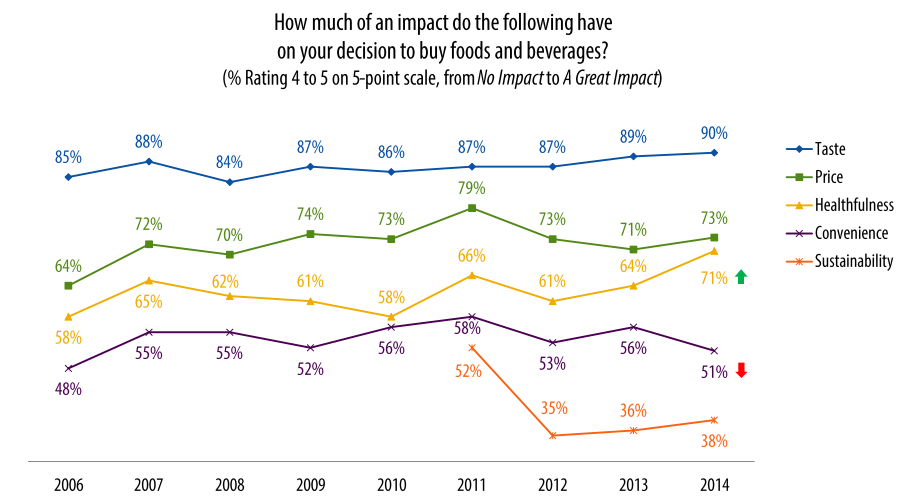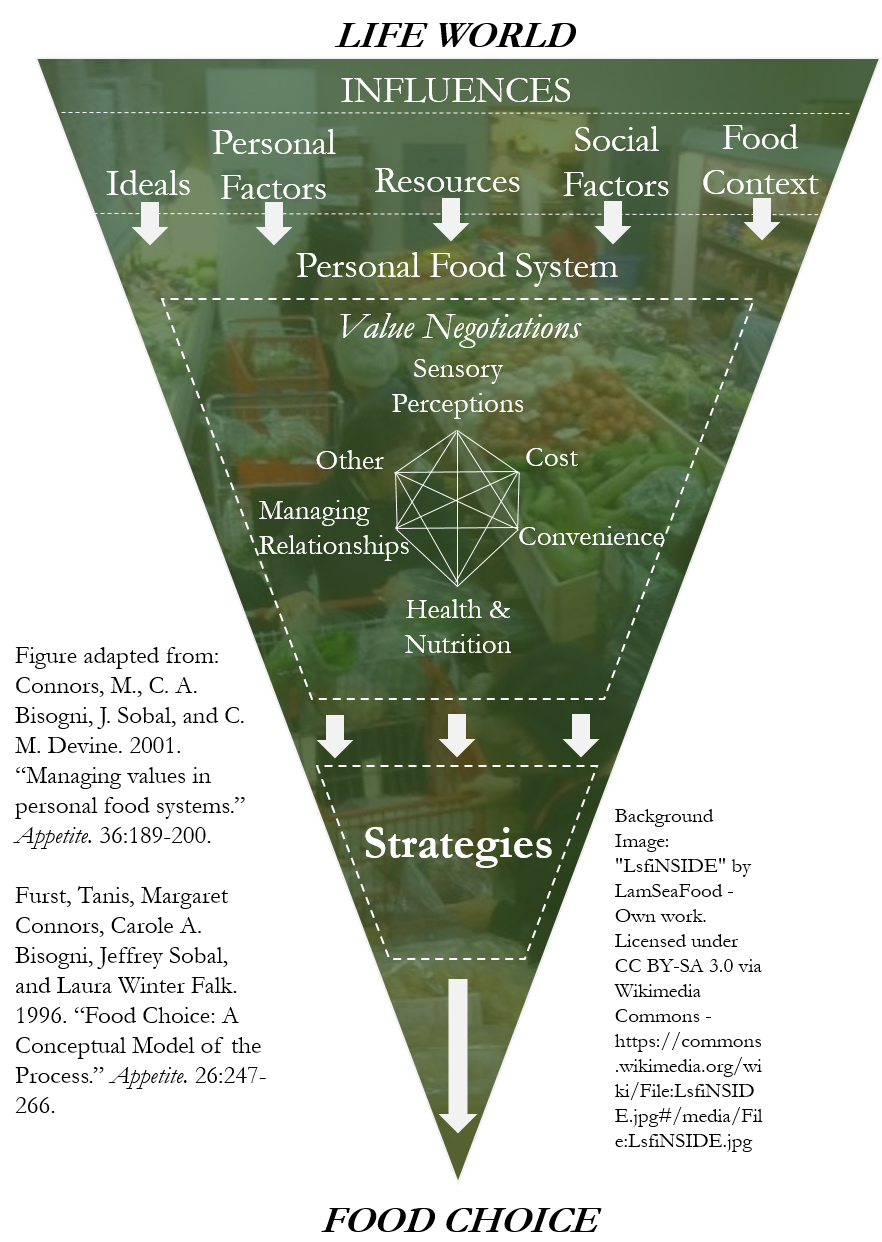How people make food choices
If we ask what influences people’s food choices the answer may seem obvious, and in some ways it is. If you think about the reasons you purchase your foods a few factors seem to dominate.
- Taste—We eat things we like. We rarely eat things that disgust us.
- Price—With limited funds we have to be careful in how our money is spent, so we take into account price when making food choices. Higher prices don’t always deter purchases, though, because we sometimes use price as an indicator of quality.
- Healthfulness—Though it sometimes seems we account little for the healthiness of foods, that is only because we often put greater emphasis on taste and price. The healthiness of food matters.
Video 1—The struggle between healthfulness and taste (from Workaholics)
- Convenience—Our time is limited, so we seek to use it wisely. Food that is more convenient to acquire will be more appealing to us.
- Other things—Though these are the main factors driving our food purchases, there are also countless other factors we could add. Our life experiences, the setting, our personal favors, and almost anything you can think of has the potential to sway our food purchases.
The graph below shows the results of a survey of over 1,000 individuals asked each year about the importance of various factors in driving their food purchases. Importance was stated on a scale of 1 to 5, with 1 being 'no impact' to 5 being 'a great impact'. The graph below shows the percent of people assigning a score of 4 to 5 for each factor, and price receives the highest percentage, with 90% indicating that it has a considerable impact on their purchases. Price is of second importance, followed by healthfulness and convenience. Last comes sustainability. This doesn’t mean that people do not care about the sustainability of food—they do, but they care about it leass than the other four factors.
Figure 1—Major factors driving food purchases

Sources: (a) Day, Cheryl. June 4, 2014. "Healthy food attitudes surveyed." Feedstuffs. Accessed August 12, 2016 at http://feedstuffsfoodlink.com/story-healthy-food-attitudes-surveyed-0-113548 (b) International Food Information Council Foundation. 2014. 2014 Food & Health Survey. Accessed August 12, 2016 at http://www.foodinsight.org/sites/default/files/2014%20Food%20and%20Health%20Survey%20Full%20Report.pdf.
To determine all the factors that influence food choices researchers have conducted interviews with shoppers, even going so far as to shop with them and chat with them as they load their grocery carts. What they have found is that almost everything matters, and they sum their findings in figures like that below.
Consider the question of whether one will purchase a meal containing tofu at a restaurant. Certainly taste matters. Some people do not like the taste, whereas I find it appealing in many dishes, and in some asian dishes can be superior to meats. An asian dish may allow the person to add either tofu or meat to it, and the meat might be more expensive, in which case price matters. A person who lives far from restaurants like PeiWei are unlikely to patron it, while someone who lives in Edmund is more likely because there is a PeiWei in town.
Then consider personal factors and ideals. If you are someone who believes that livestock production is inhumane, and that meat production results in a larger carbon footprint than tofu, you may order the tofu instead of meat even if you prefer the taste of meat because your values are driving your choices. People do not just satisfy their hunger and their palate, but their conscience as well.
The social context matters. I would purchase a tofu meal with my wife but not my father, because my father would make fun of me, calling it an effiminate meal or something like that. The food context matters. Tofu may just seem to taste better in an asian setting as opposed to a restaurant like KFC, even if the exact same meals are served. A place like PeiWei is expected to prepare tofu better than a place like KFC, and a lot of times our expectations drive our physical tastes.
Figure 2—Conceptual Model of Food Choices

Sources: (a) Furst, Tanis, Margaret Connors, Carole A. Bisogni, Jeffery Sobal, and Laura Winter Falk. 1996. "Food Choice: A Conceptual Model of the Process." Appetite. 26:247-2660. (b) Connors, M., C. A. Bisogni, J. Sobal, and C. M. Devine. 2001. "Managing values in personal food systems." Appetite. 36:189-200.
So everything about the person matters, and a succinct word for "everything about the person" is life world.
The location, time, and family in which I was raised helped produced my ideals, as did my education, life experience, genes, and everyone who influenced me. I have a nerve condition which produces chronic pain, and that makes me empathetic towards the pain of others. For this reason my conscience does not allow me to eat pork that was produced using gestation crates, as it violates my values of what is humane. The vast majority of my friends, family, and students do not share this value/belief, and believe my empathy for hogs to be rather silly.
There are personal factors that make me different from others. I don’t even have food allergies, whereas my uncle has celiac disease that prevents him from eating anything made with wheat or rye. I am of a certain age, gender, income level, and other characteristics that influences my choices.
I have different resources available to me than other people. I make more money than my siblings, which allows me to purchase more expensive foods, but I also study agriculture, giving me insights into the relationship between food production and food safety that makes me receptive of GMOs whereas some people fear them. My wife does not work, so that gives us more resources in the form of time to shop at stores that may be seen as inconvenient to others.
Our social framework matters. This refers to the composition of our social world, including family and friends. My father drinks liquor, but I don’t. Still, when he visits I purchase some for him so that he can enjoy his "snakehead" (as he calls them). What my children will eat dictates the restaurants we patron, and if we invite friends over the foods we prepare will be partly dictated by them, and not our own preferences.
People underestimate the degree to which the food context matters, meaning the setting in which the food is purchased or consumed. Little things that we say shouldn’t matter, do. Studies have found that the brighter the lights in a restraurant the healthier the food we choose. The taste of food can change according to the background noise (think beer and George Strait). In blind taste-tests people often prefer the cheaper wines, and if you lie to them and say the cheap wine was in fact expensive, they like it even more!
The life world of a person produces a unique individual with specific ideals, personal factors, resources, social factors, and food context which creates a personal food system, which you can think of as just a specific person.
Once the person food system (the person) is specified a system of value negotiations takes place when considering a purchase. Here a person is simply weighing the pros and cons of a food and trying to make a decision. They of course account for taste (sensory perceptions, which will include the major four factors discussed in Figure 1—taste (sensory perceptions), cost, healthfulness, and convenience, as well as other considerations. To make this decision an individual uses decision strategies. When people are interviewed about their strategies they sound like a set of rules or reflections justifying purchases. Some examples are below.
- "Whatever’s a good name. I’m not gonna buy a [store] brand or something like that, as long as there’s a [brand name soy sauce] ..."
- "there’s a certain brand of yogurt that my daughter likes ... I will automatically buy that brand. Because I know if I buy the other brand it will just sit in the refrigerator and rot."
- "If it’s the holidays I tend to think less about the nutrients ... This is a holiday and ... I wanna enjoy myself."
- "I buy frozen things ... for snacks for my kids. Because of my schedule and their work schedule. I always make sure that there's something in the freezer or something that they can just ... heat, and eat when they get home."
Further Information
The major source for this article is: Furst, Tanis, Margaret Connors, Carole A. Bisogni, Jeffery Sobal, and Laura Winter Falk. 1996. "Food Choice: A Conceptual Model of the Process." Appetite. 26:247-2660.
